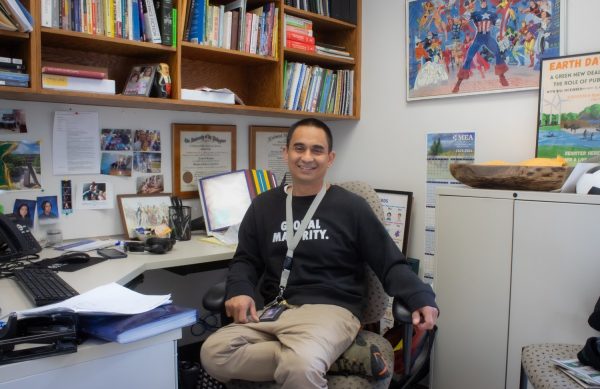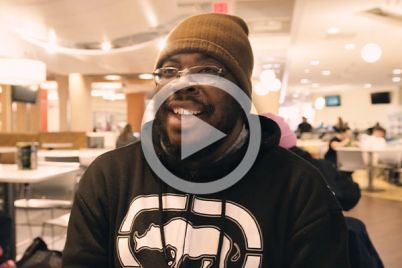
Ernesto Querijero, WCC reading and writing professor, teaches mainly developmental reading and writing. Erik Smith | Washtenaw Voice
Lily Cole
Editor
Ernesto Querijero’s office has photos of his youth and family, class schedules and campaign posters for Bernie Sanders from 2020. The room is small and homey, with just enough room for two chairs–one swivel and one not.
Querijero has been a member of the Ann Arbor Public School Board (AAPS) since 2020. This marks his fourth year on the board, with an election just around the corner.
He explains that being on the board is “all about teaching and student learning.” One of the main reasons he ran for the AAPS in 2020 was his developmental reading and writing teaching background.
“Normally, when people enter the board, if they’re not in the education space; there’s a pretty considerable learning curve,” he said.
Rima Mohammad, an AAPS trustee and a professor at the University of Michigan, quickly became friends with Querijero.
“I can relate,” she said. “I’m a professor, too, teaching very different subjects. I think that having the academic side and being very data-driven was something we could relate to.”
Sometimes, Querijero likes to play piano. He attributes the love to his mom, who also played and taught, and he sees it as a de-stressor.
“I pretty much commit to learning Philippine music. So that’s what I’ve been playing for probably about two and a half, three years now,” he said. “There’s songs from my youth. There’s songs that my mother used to play.”
“I think I was the worst piano player in my family for a long time. I know I’m not the best one,” he said. “I want to avoid criticism because I’m open to so much criticism in all the other spaces I am.”
He began teaching in 2005 in Tecumseh. He taught high school from 2005 to 2013 and took a second job at WCC in 2010, where he became a full-time employee in 2013. When he left high school teaching, he focused mainly on developmental reading and writing.
“I’m always a little disappointed when we have students who come here in a community college and can barely put together sentences and paragraphs,” he said. “I very much see that as a failure of education in public schools, particularly K-12.”
2020-2024 term
Querijero ran for the board to see change, and during his four years on the school board, he prioritized environmental sustainability. He helped create a volunteer committee on sustainability, which created a framework and appointed a sustainability officer.
“We want sustainability to be on the same levels as all the other issues–special education, equity, and all those big issues in the school district, you might imagine,” he said.
When he introduced a ceasefire resolution regarding the Israel-Gaza war to the board in January after a student brought forward a motion for one, it was met with public outcry. “The way I presented it to the board was, ‘I believe in the sanctity of human life, don’t all of you?’ It’s easy to conclude that bombing is wrong no matter where it is,” he said.
Querijero also called for an Equity Committee with AAPS and adopted a land acknowledgment for the district. This acknowledgment is now read at every board meeting and highlights the district’s commitment to equity and local history.
He advocated for staffing reports. “It’s been two years,” Querijero said. “Not a single Asian or Asian American person is represented among the 64 school leaders and 15 district leaders.”
“I identify as an Asian American, and if I don’t say anything about those things, then most people won’t,” he said.
Mohammad expresses gratitude: “We had so much more in common than probably other trustees, especially focusing on evidence, making evidence-based decisions, and looking at data, but also really fighting for and always advocating for the marginalized students, families, teachers and staff in the district.”
Querijero is a core organizer of the Asian Pacific Islander, South Asian and Asian Parent Advisory Group recognized by the district in 2021. He helped facilitate virtual author talks during Asian American Heritage Month and organized a book drive to add Asian literature to school libraries.
2024 campaign
Querijero’s 2024 campaign focuses on financial transparency. This past spring’s AAPS budget crisis showed a $25 million shortfall, of which $14 million was attributed to a clerical mistake. Yet, the investigation offered details without financial specifics, revealing the need for more explicit budget reporting. Querijero hopes to see specific codes to help the public understand where funds are and foster trust.
He discusses the need for more student engagement in meetings and wants their input. “The only spot where they can really come in right now is in the public commentary,” he said.
The goal is to build a more sustainable, built-in policy to ensure student engagement. The board tried to create a Student Advisory Committee, but it had low participation because students were juniors, then seniors, and therefore, “aged out. ”
Querijero emphasizes the importance of equity and wants to see an equity team created. He describes equity among schools as inconsistent, leading to unequal student experiences and feelings of belonging.
“When all those eighth-graders come together and start talking about what their school was like, you imagine some feeling lost and left out as if they don’t belong. That’s one of the significant issues young people face. What’s your sense of belonging?” He said.
Querijero said he often asks why there isn’t a racial equity officer in Ann Arbor Public Schools.
“Equity is the work of everybody. What happens when equity goes wrong, though? Do we now hold everyone accountable? Or is now no one responsible?”
Mohammad describes Querijero as a strong, courageous leader. She explains that he always thinks of principles as his own and that’s the type of leader who makes a positive change for everyone.
“I believe that his lived experiences drive how he is as a leader,” Mohammad said. “But also his decisions.”

